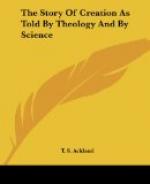1. It gives us no account whatever of the origin of matter, but assumes that it was already in existence at the time from which the theory takes its point of departure. But some account of it must be given. Either it was created by some higher power, or it was eternal; for the idea of its being self-originated is manifestly untenable. If it was created, there is an end of the theory—the act of creation assumes the existence of a Creator; and the only question left is, whether that Creator did more or less. But the very object of the theory was to dispense with the existence of a Creator. This alternative, then, it must reject, and there is nothing left but to fall back upon the other, and to assume that it existed from all eternity. But it is certainly not less difficult to us to conceive the possibility of inert matter being self-existent and eternal, than it is to recognize the existence of an eternal and all-powerful Spirit. Our own consciousness helps us to realize the possibility of the existence of an Eternal Mind, and of the exercise of power by that mind; but we have nothing to help us to a conception of self-existent matter.
In addition to this, the idea of eternity precludes from its very nature the idea of possible change. If there is change there must be the distinction of before and after, and so of the succession of existence, which involves the idea of time. That which is subject to change, and this theory assumes a change in the condition of matter, cannot be eternal.
2. The next failing point is, that this theory assumes a change, of the origin of which it can give no account. The assumption is, that matter which had existed from all eternity, or for an indefinite time, in a state of perfect rest, suddenly began to move towards its centre of gravity. A body, or a system of particles, can remain at rest only under one of two conditions. Either it must be acted on by no force at all, or all the forces by which it is acted on must be in perfect equilibrium. If matter existed under the first of these conditions, whence did the force suddenly emanate? Force cannot be self-originated any more than matter. But if the other alternative be adopted, how was the equilibrium disturbed? It is a fundamental axiom of mechanics that “a body (or system of bodies) at rest will continue at rest till it be acted upon by some external force.” But the theory supplies no such external force, for it could only originate in that which the theory ignores—the will and power of some intelligent Being.
3. The third defect is, that the theory does not give any satisfactory account of the origin of the motions of rotation and revolution. Laplace does not attempt this. He simply assumes that a motion of rotation was set up somehow; but many of his followers, perceiving that the theory broke down here—though they passed the other two defects unnoticed—have attempted to supply the deficiency in this point. Some have attempted




